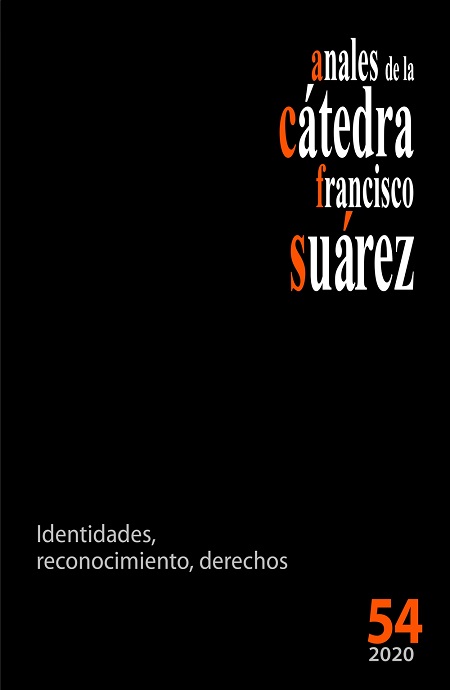Identidad nacionalista y violencia. Apuntes críticos
DOI:
https://doi.org/10.30827/acfs.v54i0.9751Keywords:
identidad, nacionalismo, memoria colectiva, alteridad, violencia étnicaAbstract
El discurso primordialista sobre el origen de las identidades sociales etno-nacionales sigue latiendo en algunos enfoques históricos, antropológicos, políticos y jurídicos de las sociedades modernas, camuflado en otras formas iusnaturalistas y biologicistas de concebir los atributos culturales, étnicos, religiosos, conductuales, e incluso económicos de los pueblos. Este artículo pretende presentar, por el contrario, la construcción de las identidades nacionales desde el punto de vista modernista y analizar su papel como discurso que pretende reforzar estructuras de poder, producidas porque tienen utilidad estratégica para el logro de bienes materiales o políticos, formalmente en nombre del grupo, pero de hecho solamente con objeto de dar ventaja a los líderes o las élites. Cuando llevan aparejado un carácter político, las identidades nacionales, culturales y étnicas son susceptibles de provocar conflictos violentos, la naturalización de la violencia y la deshumanización de otros grupos tienen lugar a menudo cuando de conflictos etno-nacionalistas se trata.
Downloads
References
Anderson, B. (1983). Comunidades Imaginadas. Reflexiones sobre el Origen y la Difusión del Nacionalismo. México D. F.: Fondo de Cultura Económica.
Blumi, I. (2003) “Ethnic Borders to a Democratic Society in Kosova: The UN's Identity Card” en Florian Bieber, Židas Daskalovski (eds.) Understanding the War in Kosovo (pp. 213-232). Portland: Frank Cass Publishers.
Crawford, Beverly. 1998. “The Causes of Cultural Conflict: An Institutional Approach” En Beverly Crawford y Ronnie D. Lipschutz (eds.).The Myth of “Ethnic Conflict”: Politics, Economics, and “Cultural” Violence (pp. 3-43) California: University of California Press.
Devereux, G. (1971). Ensayos de Etnopsiquiatría general. Barcelona: Barral Ediciones.
Douglas, M. (1973). Pureza y Peligro. Madrid: Siglo XXI de España Editores.
Duffy Toft, M. (2003). The Geography of Ethnic Violence. Identity, Interests, and the Indivisibility of Territory. New Jersey: Princeton University Press.
Faraldo, J. M. (2001). “Modernas e Imaginadas. El Nacionalismo como Objeto de Investigación Histórica en las dos últimas Décadas del Siglo XX.” Hispania, LXI/3 (209): 933–964. Consultado 22 de abril, 2019.
Freud, S. (1979) [1921]. Mas allá del Principio de Placer, Psicología de la Masas y Análisis del Yo, y otras obras (1920-1922), Obras completas, vol. XVIII. Buenos Aires-Madrid: Ed. Amorrortu.
Geertz. C. (1973). La interpretación de las culturas. Barcelona: Gedisa.
Gellner, E. (1988). Naciones y Nacionalismos, Madrid: Alianza Editorial.
Gomberoff, L. (1999). Otto Kernberg. Introducción a su Obra, Santiago de Chile: Publicaciones Técnicas Mediterráneo LTDA.
Hall, S. (1996) “The Question of Cultural Identity” en Stuart Hall, David Held, Don Hubert y Kenneth Thompson (eds), Modernity: An Introduction to Modern Societies, (pp. 596-625). Nueva Jersey: Basil Blackwell Inc.
Hobsbawm, E. (1992). Nations and Nationalism since 1780: Programme, Myth, Reality. Cambridge: Cambridge University Press.
Hobsbawm, E. y Ranger, T. (1983). The Invention of Tradition. Cambridge: Cambridge University Press.
Hroch, M. (2000). Social Preconditions of National Revival in Europe: A Comparative Analysis of the Social Composition of Patriotic Groups Among the Smaller European Nations. Nueva York: Columbia University Press.
Huysseune, M. (2010). “Defending National Identity and Interests: The Lega Nord’s Asymmetric Model of Globalisation”. Studies in Ethnicity and Nationalism: Vol. 10 (2): 221-233. doi/10.1111/j.1754-9469.2010.01078.x
Kaufmann, E. y Conversi, D. (2012). “Ethnic and Nationalist Mobilization” en Guelke A. & Tournon J. (Eds.), The Study of Ethnicity and Politics: Recent Analytical Developments (pp. 47-78). Opladen; Berlin; Farmington Hills: Verlag Barbara Budrich. Disponible en http://www.jstor.org/stable/j.ctvdf071x.6
Kecmanovic, D. (2002). Ethnic times: exploring ethnonationalism in the former Yugoslavia. Westport, CT: Praeger.
Máiz, R. (1994) ¿Etnia o política? Hacia un modelo constructivista para el análisis de los nacionalismos. Revista IFP N.3: 102-121.
Mertus, J. A. (1999). “Nationalism and the Liberal State”, en Ruth Wedgwood (ed), After Dayton: Lessons of the Bosnian Peace Process, (pp. 48-50). Nueva York: Council of Foreign Relations.
Mladjenovič, L. (1993) “Serbian Women Unite against the War”, Madre Newsletter.
Murillo Ferrol, F. (1997) Reflexiones sobre el Pasado y su Inevitable Manipulación, Discurso de recepción del académico de número en la Real Academia de Ciencias Morales y Políticas.
Oberschall, A. (2007) Conflict and Peace Building in Divided Societies. New York: Routledge.
Olick, J. K. (2007). “From Usable Pasts to the Return of the Repressed”, The Hedgehog Review. Critical Reflections on Contemporary Culture. Summer nr. Disponible en https://hedgehogreview.com/issues/the-uses-of-the-past/articles/from-usable-pasts-to-the-return-of-the-repressed
París Pombo, M. D. (1999). “Racismo y nacionalismo: la construcción de identidades excluyetes”. Política y Cultura 12: 53-76 Xochimilco: Universidad Autónoma Metropolitana.
Popov. A. (2012) “Re-making a Frontier Community or Defending Ethnic Boundaries? The Caucasus in Cossack Identity”, Europe-Asia Studies, 64(9): 1739-1757, doi/10.1080/09668136.2012.718422
Prewitt-Freilino, J. y Bossom J. K. (2008) “Defending the Self against Identity Misclassification”, Self and Identity 7:168 – 183, doi/10.1080/17405620701330706
Ross, M. H. (2007) Cultural Contestation in Ethnic Conflict. Cambridge: Cambridge University Press.
Sripokangkul, S. (2019). “Demonology and Contemporary Thai Politics” The International Journal of Civic, Political, and Community Studies 17 (1): 1-14. doi:10.18848/2327-0047/CGP/v17i01/1-14.
Tajfel, H. y Turner, J. (1979). “An integrative theory of intergroup conflict”. En William G. Austin and Stephen Worchel (eds.)The social psychology of intergroup relations (pp. 33-47). Monterey: Brooks/Cole Pub.
Weller, C. (1997). “Collective Identities in World Society” Mathias Albert, Lothar Brock, Klaus Dieter Wolf (eds.) Civilizing World Politics: Society and Community Beyond the State (pp. 45-68). Maryland: Rowman and Littlefield Publishers.
Downloads
Published
How to Cite
Issue
Section
License
Authors are the owners of the rights to their works. ACFS requests that publication notice on ACFS is disclosed if they appear later in another place.

















